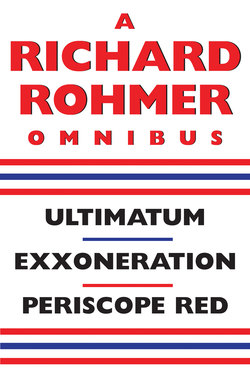Читать книгу A Richard Rohmer Omnibus - Richard Rohmer - Страница 15
На сайте Литреса книга снята с продажи.
ОглавлениеOttawa / 9:30 a.m., EDT
The Prime Minister entered the Cabinet Room. After greetings were exchanged and everyone was seated, he said, “Gentlemen, I have brought you here to advise me. We are facing an emergency of the first magnitude. Since you represent the ministries most closely involved in the crisis, I felt that I should consult with you first.”
He then went on to report the telephone call from the President and the nature of the ultimatum from the United States. When he was finished, his audience was shocked and incredulous.
Without pausing for comment, the Prime Minister continued quickly, “We will, of course, discuss the situation in detail at the full Cabinet meeting later today. Now I want you to prepare for a briefing to be held tomorrow morning at eight o’clock.
“The briefing will be for all members of Parliament, including the Senate, and the provincial premiers who can get here. It should be a crash course for everyone on the status of the Arctic Islands gas and oil discoveries and development. For example, it should cover the number of rigs in operation there, the number of people involved, the ownership and control of the gas and oil fields, the interests of Panarctic, and the position of Tenneco, Columbia Gas, and other major American firms that have been advancing money to Panarctic for exploration work. It should deal with the estimated reserves of natural gas and oil and the commitments made by Panarctic and the other owners in the islands to United States firms. And it should also give the National Energy Board’s figures on what they calculate will be surplus to Canada’s requirements.
“Then I want the same information for the Mackenzie Delta region, and I want growth and demand figures for the United States itself, an analysis of their energy crisis and of the long-term efforts they’ve taken to cope with it.
“The next thing we’ll need is a status report on the Mackenzie Valley pipeline, the problems that have occurred, both in building it and financing it. We should also be brought up to date on the state of the government’s discussions with the native people concerning aboriginal rights, and on the sabotage which has been taking place.
“Then I would like to have an informed guess on the type and scope of the economic sanctions that the United States might impose if we refuse to give in to their ultimatum, and a review of the sanctions and other measures they’ve used in the past two decades to protect their economy and world trading position.
“A similar survey showing what forms of military pressure have been invoked by the United States in various parts of the world since 1945 would be useful. External and National Defence could work that out for us.
“Finally we should have a review of the United States’ position concerning our sovereignty in the Arctic, dating back to the Manhattan voyages in 1969 and ’70, and the enactment of the Arctic Waters Pollution Prevention Act at that time.
“The objective I have in mind, gentlemen, is to give every member of the House a factual briefing on the background behind each element of the ultimatum. I think you’ll be surprised at how little most members know about what is going on in the Canadian Arctic about oil and gas, and about our ongoing relationship with the United States and with our native people.
“The briefing will be in the Commons Chamber. As I said, it will start at 8 a.m. Each of you will have twenty-five minutes to make your presentation and answer questions. That’s really very little time, but it’s the best we can do under the circumstances. I want the briefings to be precise and to the point. They must be finished by eleven o’clock because the House will sit at twelve noon to debate the ultimatum. I have no objection if a deputy minister rather than the minister makes the presentation, and of course you can be assisted by any other advisers you wish.”
At this point, Tom Scott entered the room and spoke quietly to the Prime Minister. After receiving instructions, he nodded and departed. The Prime Minister turned back to his colleagues.
“Mr. Scott has just informed me that the office of the President has been on the line. He requests permission to make a flight over Canadian territory to inspect the Polar Gas Study experimental station on Melville Island and to inform himself of conditions in the North generally. I can see nothing to be gained by refusing this permission. Indeed, we may gain by granting it. The President may have more understanding when he sees the difficulties under which we’ve been operating. I’ve therefore told Tom to give the President clearance. I trust this meets with your approval.”
There was a general murmur of consent, and the Prime Minister continued. “Now to get back to the briefing session: Bob, I want you to start off.”
The Prime Minister was speaking to Robert Gendron, Minister for External Affairs. Gendron was the Prime Minister’s right-hand man in the Cabinet, the leader of the Quebec sector of the party, and by far the most experienced of all the ministers.
“I think it’s important for you to give a broad overview of our relationship with the United States. I don’t care who follows after that. It might be a good idea if you carried on with this meeting now to sort out the details. There is to be a full Cabinet meeting at 12:15, so as soon as you can get your staffs going on the briefing material the better.
“I have asked for a meeting with the Leader of the Opposition and the other parties. They should be waiting for me now. I hope you will excuse me.”
